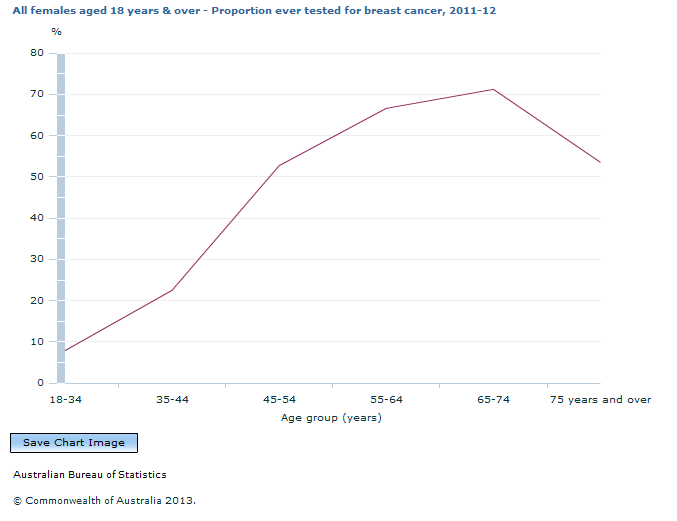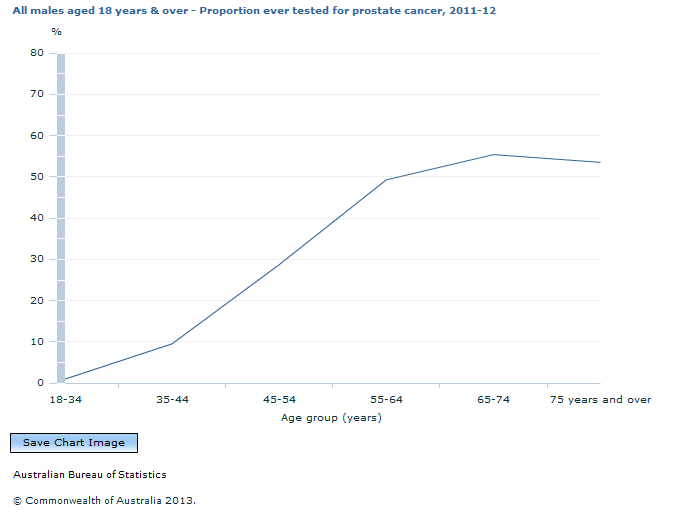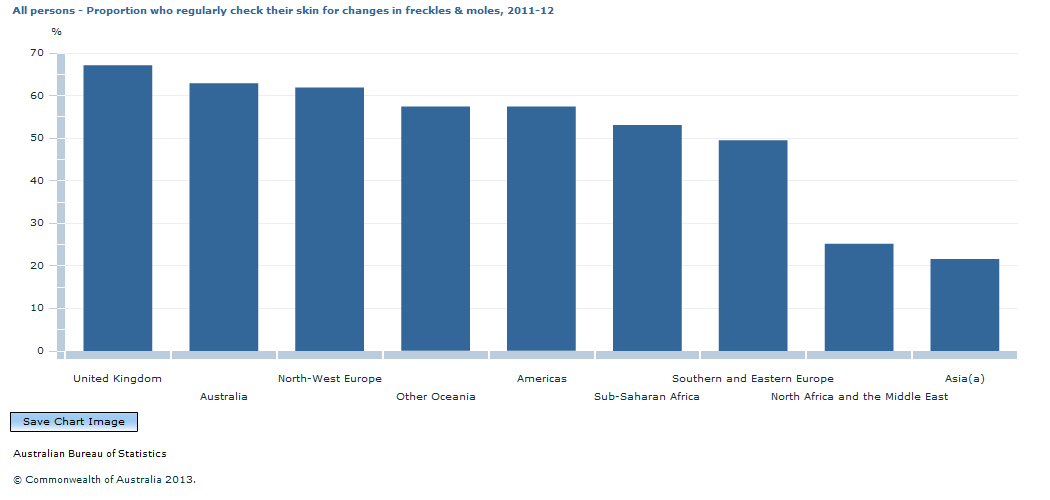4364.0.55.002 - Australian Health Survey: Health Service Usage and Health Related Actions, 2011-12
ARCHIVED ISSUE Released at 11:30 AM (CANBERRA TIME) 26/03/2013 First Issue
Page tools:
 Print Page Print Page
 Print All Print All
| |||||
Cancer is a condition in which the body's cells grow and spread in an uncontrolled manner. A cancerous cell can arise from almost any cell, and therefore cancer can be found almost anywhere in the body1. People with cancer In 2011-12, 1.5% of Australians (or around 327,000 people) reported having cancer. Of all people with cancer, 71.5% had consulted a GP in the last 12 months for their condition while 75.4% had consulted a specialist. Proportionally, more people with cancer had consulted a specialist in the last 12 months for their condition than people with any of the other long-term health conditions published in this release (which ranged between 6.0% and 52.8%, see Health actions taken for specific long-term health conditions). In the last 12 months, 21.4% of all people with cancer had consulted an other type of health professional, with proportionally more females than males having consulted an other type of health professional (29.1% and 16.3% respectively). Of all people with cancer who were currently employed or studying/at school, almost one-third (30.9%) had time off work or study/school in the last 12 months due to their condition. This was the second highest proportion, behind people with mental or behavioural conditions (31.2%), amongst the long-term health conditions published in this release. When interpreting data from the Australian Health Survey it should be noted that the survey excluded persons in hospitals, nursing and convalescent homes and hospices. These exclusions are expected to have a greater effect on data on cancer than for most other conditions, as a relatively high proportion of people with cancer may currently reside in these facilities. Cancer screening - all persons Early detection of cancer increases the chance of treatment being effective. There are a number of different types of cancers for which people can be screened. In the Australian Health Survey, respondents were asked whether they had ever been tested for specific types of cancer, including bowel, breast (females only) and prostate (males only). The National Bowel Cancer Screening Program targets people from 50 years of age. The test can be performed at home and looks for hidden traces of blood in a bowel motion in people without bowel cancer symptoms2. In 2011-12, 30.3% of all persons aged 50 years and over had been tested for bowel cancer at some time in the past, with men more likely to be tested than women (33.6% and 27.3% respectively). BreastScreen Australia targets women aged 50 to 69 years for regular mammograms. Women aged between 40 and 49 years may also access the breast cancer screening program3. Of all women aged 50 years and over, 64.4% had been tested for breast cancer at some time in the past.  Prostate cancer is more common in men aged over 50 years and regular discussions with GPs are recommended4. Of all men aged 50 years and over, 48.4% had been tested for prostate cancer at some time in the past.  Over half (58.5%) of all people reported regularly checking their skin for changes in freckles or moles in 2011-12. The proportion of people who checked their skin differed considerably by country of birth. People born in the United Kingdom were most likely to regularly check their skin (67.1%) followed by people born in Australia (62.9%), while people born in Asian countries were the least likely (21.6%).  Footnote(s): (a) Includes South-East Asia, North-East Asia, Southern and Central Asia. Source(s): Australian Health Survey: Health Service Usage and Health Related Actions For more information see Table 8 Cancer: Actions and medications taken and Australian Health Survey: First Results, 2011-12 (cat. no. 4364.0.55.001). 1. Cancer Council Australia, Feb 2012, What is cancer?, <http://www.cancer.org.au/about-cancer/what-is-cancer/>, Last accessed 22/03/2013. 2. Cancer Council Australia, July 2012, Bowel cancer screening, <http://www.cancer.org.au/about-cancer/early-detection/early-detection-factsheets/bowel-cancer.html>, Last accessed 22/03/2013. 3. Cancer Council Australia, July 2012, Breast cancer screening, <http://www.cancer.org.au/about-cancer/early-detection/early-detection-factsheets/breast-cancer.html>, Last accessed 22/03/2013. 4.Cancer Council Australia, July 2012, Prostrate cancer screening, <http://www.cancer.org.au/about-cancer/early-detection/screening-programs/prostate-cancer-screening.html>, Last accessed 22/03/2013.
|
|||||
